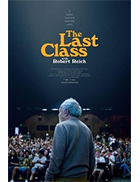The Last Class
|  If you pay any attention to the news, then you are probably aware of the fact that there is a cultural and political war being waged against higher education in the United States. This war has been a hallmark of the first months of the second Trump Administration, as the President, newly emboldened and surrounded by people in power who are not just willing to do his bidding, but are in complete ideological lockstep, has pulled levers of power against educational institutions that would previously have seemed unfathomable: withdrawing hundreds of millions of dollars of federal research money, rescinding visas for foreign students, and pressuring universities to conform to hiring practices dictated by the government and submit to federal oversight of certain departments. Even as I am writing this, the president of the University of Virginia, founded by Thomas Jefferson and one of the finest institutions in the country, has just stepped down because he would rather leave his position than “fight the federal government.” And what are the charges against higher education? Initially it was antisemitism, which is certainly present and festering on many campuses and has not been handled well by too many administrations. However, that has quickly been revealed to be a cheap façade, a convenient excuse for exerting the kind of government coercion against independent academic institutions that is the hallmark of authoritarianism. What is the real sin? Ah, it’s the old canard that higher education is too liberal—that insidious Marxist professors are indoctrinating young minds with anti-American hatred, that these professors are just social justice warriors in disguise, that critical race theory is being embedded into every discipline as some kind of virus to ensure the downfall of traditional conservative values and to breed hatred for white men. It’s the tired old David Horowitz argument that colleges and universities are infected with dangerous professors sympathetic to terrorists and communist regimes who are using the classroom to undermine the greatness of America. Enter Robert Reich, the subject of Elliot Kirschner’s new documentary The Last Class. Reich would seem to be the poster boy for exactly the kind of liberal bias and elitism that conservatives find so concerning. An Ivy League-educated lawyer, economist, and lifelong academic who served as Secretary of Labor under Bill Clinton, he has been a regular political commentator on television and the Internet for decades. An inveterate Trump critic, he has long argued against virtually everything that the modern Republican Party stands for, particularly tax cuts for the wealthy, deregulation, and the theory of trickle-down economics. From 2006 to 2022, he was the Chancellor’s Professor of Public Policy at the Goldman School of Public Policy at the University of California–Berkeley, one of the most notoriously liberal institutions on the planet (he previously taught at Harvard and Brandeis). Yet, watching Reich in The Last Class (he is present in every frame of the film), we get the sense not of some frothing Marxist agitator wanting to stick it to the wealthy and the powerful, but rather a probing intellectual who is first and foremost determined to instill in his students the ability to think for themselves (“A good teacher instills both curiosity and critical thinking,” he asserts). In both the classroom and in sit-down interviews throughout the film, he never says anything about indoctrinating his students with any particular point of view, even though his are very well known. Rather, he emphasizes the desire to equip them with the tools of critical thinking by supplying them with facts and encouraging them to work through to their own conclusions. He describes himself at one point as a “devil’s advocate” who takes all kinds of positions in the classroom to get his students talking and thinking, and during a faculty meeting he stresses the need to not just protect, but encourage students with minority viewpoints (which, at Berkeley, is of the politically conservative variety). A man of short stature (about which he regularly jokes) and deep thought, Reich stands as a rebuke to the McCarthyesque terror of liberal bias in American universities, fueled by the presence of some genuine radicals whose extremism is used to justify the wholesale vilification of one of the country’s greatest institutions (there is a reason why students all over the world want to come to the U.S. to learn). The title of Kirschner’s documentary refers to the final class meeting of Reich’s popular “Wealth & Poverty” course at Berkley in 2022, and while the film begins and ends with that class, it is not really about the class itself. Rather, it is about Reich and the idealism he brings to his academic endeavors, which makes the film a beacon of optimism in a world that increasingly encourages despair and pessimism (“Pessimism is okay,” Reich says at one point. “Cynicism is not.). Even though Reich has worn many hats throughout his long career in the public eye, he has always considered himself first and foremost an educator, and it shows in the way he handles himself in the classroom. Although he is admittedly a kind of academic rock star, nothing about him suggests a raging ego or a sense of angry entitlement. In his rumpled clothes and Velcro shoes, he exudes sturdy passion about the subject matter he teaches, and he clearly cares about the students in his classroom, even if there are so many of them (at least 300) that he can’t know them all by name. Yet, throughout The Last Class he demonstrates what American education looks like at its best, calling into question exactly why there is so much hand-wringing over political indoctrination on college campuses. The only thing Reich’s students are being indoctrinated with is the need to think for themselves, and they are all the better for it. Copyright © 2025 James Kendrick Thoughts? E-mail James Kendrick All images copyright © Abramorama |
Overall Rating: 

 (3)
(3)


